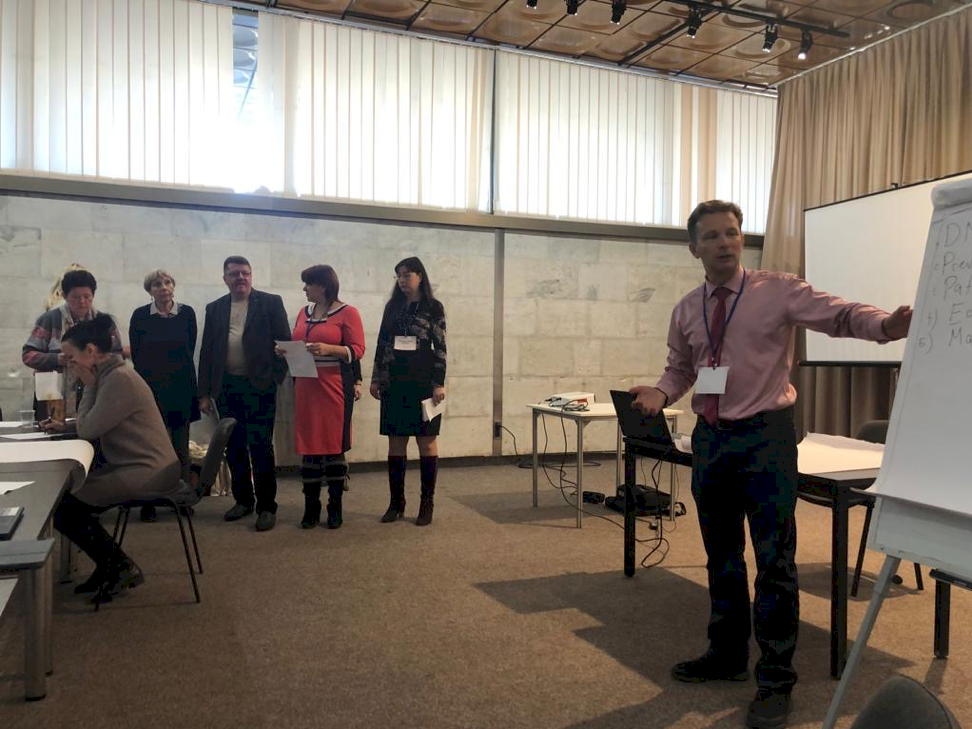
Setting
The International Conference of Ukrainian Family doctors, conducted by the Ukrainian Association of Family Doctors, was held in Kiev on 5-6 December 2019. More than 750 Ukrainian family doctors, nurses, managers of primary care, trainers and trainees, residents of family medicine took part in the event. The traditional every 6 months events become winter and summer highlights for medical practitioners from different regions of Ukraine. The meeting took place in the Ukrainian Congress Hall in the center of Kiev. This time the meeting was attended by:
- Zoryana Skaletska, Head of Ukrainian Ministry of Health Care
- Mehmet Ungan, President of WONCA Europe, Professor of Family Medicine at Ankara University (Turkey)
- Zalika Klemenc-Ketiš, President of EQuiP-WONCA Europe, Assistant Professor of Family Medicine, MD, PhD, Medical School Maribor (Slovenia)
- Radost Assenova, EGPRN Council Member, PhD, Professor of Family Medicine (Bulgaria)
- Liga Kozlovska, President of Rural Family Doctor Association, Chief of Private Practice, Head of Family Medicine Residency Program of Riga Stradins University (Latvia)
- Victor Yaskiv, Coordinator of International Resuscitation Training Center of American Heart Association (Israel)
After the plenaries, several workshops with international participation were conducted. One of workshops was dedicated to an actual topic in Ukraine: Quality indicators of family doctors practice: sharing the international experience, developing the Ukrainian model. Zalika Klemenc-Ketiš, President of EQUIP (WONCA Europe), and Pavlo Kolesnyk, Director of Department of International Affairs of Ukrainian Association of Family Doctors chaired the session.
Background
There are no quality indicators in Ukrainian primary care now. The system is on the stage of transition from the old post-Soviet model where there no stimulation for a good quality, but only punishment for some indicators that were considered as indicators of family doctor’s activity (I.e. disease rate, mortality rate, risk group population, number of fluorography, x-rays etc.). During the reformation the old system of indicators was ruined but the new system was not created yet. The Ukrainian doctors started to be payed for number of registered population according to the capitation without extra stimuli. The quality of family doctor’s work is not evaluated yet and remains low.
Aim of the workshop
The aim was to create a work group of primary care professionals to make recommendations concerning feasible quality indicators to be accepted by the Ukrainian Ministry of Health care.
Structure
During the first part - Sharing the international experience - Zalika Klemenc-Ketiš, President of EQuiP-WONCA Europe, explained the system of creating the quality indicators and showed the example of the model in Slovenia. Then foreign experts from different countries had an opportunity to share the existing indicators in their countries: Turkey, Latvia, the Czech Republic, and Israel.
The second part - Let’s develop the Ukrainian proposals of quality indicators - was held like a small group discussion. The participants were divided into 5 small groups. Each group was given a task to develop quality indicators in one of the topics:
- Patient’s safety
- Medical education in the clinic
- Clinical indicators (e.g. diabetes mellitus)
- Family medicine practice management
- Prevention and screening
Each group had to develop 3 indicators of quality in the way:
- Structure
- Process
- Results
After this, they presented the most important indicator that they have discussed in each of the groups.
Feedback
After the active discussion the group responsible for Patient’s safety suggested to create or get acquainted with the law statement considering the rights of patients, to let doctors know their rights and evaluate patient’s satisfaction as a result which may be an indicator of quality.
The group Medical education in the clinic suggested to formulate the requirements for the clonic ready for residency training and to count number of the residency trained in the clinic and evaluate their satisfaction by the way of training.
The group Clinical indicators (e.g. diabetes mellitus) suggested to create a data of patients with DM I, then to evaluate the number of them who were tested by HbA1c and number of the patients managed in the practice in whom the target level of HbA1c was achieved.
The group Family medicine practice management” suggested to evaluate number of vaccinations performed or BMI testing according to a number of the patients registered in the clinic.
The group Prevention and screening suggested to create a data of patients in the clinic and to use the questionnaire recommended by local protocol to screen for TB and evaluate number of patients evaluated by the screening.
Conclusion
Zalika emphasized the importance of development of local indicators of quality for Ukraine, considering the international experience by the primary care practitioners. She proposed the Ukrainian Ministry of Health Care how to implement this into practice.
Pavlo suggested to establish local groups to develop quality indicators feasible for family medicine practices in Ukraine.
It was decided to delegate members of the Ukrainian Association of Family Doctor (Albina Zharkova) to participate in the EQuiP Summer Schools as well as EQuiP conferences and meetings to coordinate and cultivate the Ukrainian workgroup in that perspective.
Mehmet Ungan also suggested to support Ukrainian activities in this field and to make a link between WHO and the Ukrainian Association of Family doctors to support activities of family doctors in the topic.
Published on 9 December 2019.
